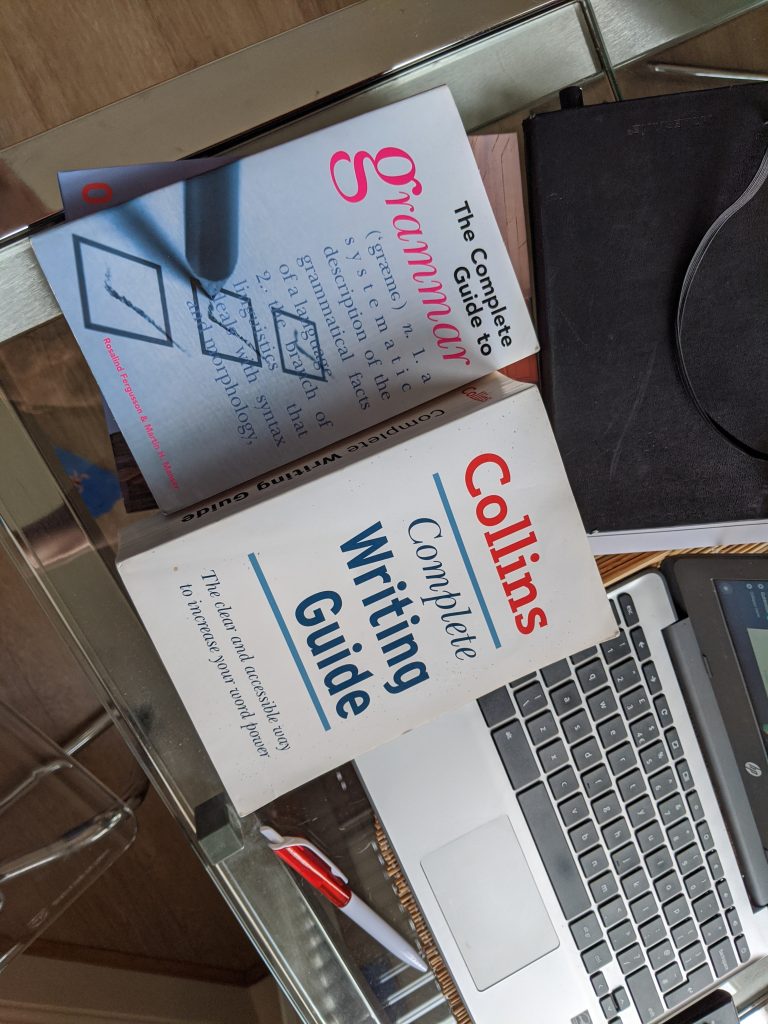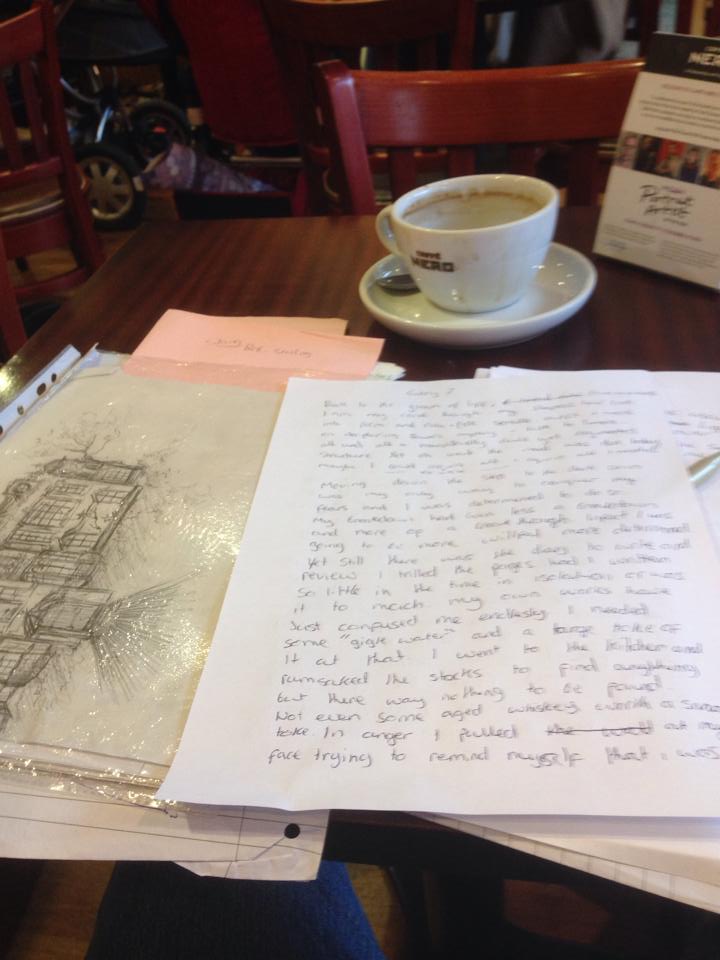Being dyslexic and a writer can be extremely challenging. There is already a hurdle in the way when I start writing, but that doesn’t mean it is impossible! For many years I used my dyslexia as a scapegoat for poor grammar and as a way to avoid professional writing altogether.
However, in today’s modern world, there are tools accessible to aid a dyslexic writer. I am going to point out some of the useful techniques I used when writing my own book as well as providing some contextual background information about me in this post.

How Dyslexia affects me
First I would like to explain dyslexia and how it affects me as a writer. Dyslexia is a learning difficulty that can affect the way people spell, read and write. It is not to be confused with a learning disability as is does not affect intelligence. People with dyslexia tend to read and write slower than the average person, and will confuse the order of words.
I went through most of my childhood unaware that I was dyslexic. I had managed to excel in English class during Primary school due to the creative nature it usually entailed. However, when grammar came into the equation I became angry and hostile toward the subject. I had managed to move up in my class level, but somehow I seemed to be reading at a younger age range.
I was only diagnosed with dyslexia during my teenage years, after I realised I kept confusing words like ‘who’ and ‘how’ in my written language. Along with confusing words, I would often write my letter’s the wrong way round such as writing a b instead of a d. However, this only got me additional examination time instead of any additional tutorial help.
Despite my diagnosis, I still managed to get an A in my English GCSE, which encouraged me to go into further education. It was only when I went to university I got full support.
Prior to this, I often heard comments like ‘But, doesn’t Word correct your spelling’ or ‘You just need to edit your work’. These comments used to infuriate me because what many people do not realise is that Word does not always pick up on every single error. For example, words that have been mixed up like my previous example of who and how.
It was in university I was given free software that reads the text aloud, which instantly allowed me to see (or rather, hear) common mistakes in my work. This was the first revolutionary thing to help me with my writing. You can find free software that can do this online nowadays.
However, it is not a magical fix-all solution. Indeed, after getting this software I was still hiding behind my dyslexia when talking to other academics. I was ashamed to show my writing. I would refuse to acknowledge grammatical rules justified by the fact ‘I was not able to learn it’. Yet, something began to click as I become exposed to talented writers: grammar rules mattered!
After university, I realized punctuation and grammar were an absolute necessity in professional writing. Even a simple email requires a set of rules. It was official, I was in grammar hell, surrounded by a world of comma splices and spelling errors. I continued to bury my head in the sand writing only from the heart. The end results were often a mass of wordy text that was at times unintelligible.
After enrolling into French classes, I reached the point where hiding from grammar was impossible. Learning another language required an understanding of the fundamental workings of languages. For example, how one conjugates verbs in French is very different from English. Without an understanding of the rules in English, I could only reach a certain level.
I realised I had managed to climb so far on my creativity, but I needed to tune up my skills. So, I enlisted in an adults Grammar Course. Initially, I hated the classes but the more I discovered the beauty of language the more my writing improved. Grammar classes vary in the cost depending on which area you live, but I managed to find an affordable class which could fit around my work schedule.

- Learn some basic grammar rules
There is NO shame in learning the basics, like what is a verb, adjective, noun, or pronoun. Learning these basics becomes the building foundations for you to improve your writing. I still do not understand the entire complexity of the English language, but grammar lessons have changed the way I structure my sentences.
I personally find just reading about the topic is not enough. I need examples laid in front of me and lessons enabled me to gain more knowledge. YouTube can be a great tool to learn rules of grammar but I would suggest finding someone to practice with as it helps keep the rules into your head.
Commas are particularly tricky to perfect. I am constantly making a grammatical error called sentence splicing (putting commas where they are just not needed). The FANBOYS rule is a real life saver when editing my work. FANBOYS stands for the following words:
For, and, nor, but, or, yet and so!
We use these words to connect other words, phrases, and clauses together. I admit I still Google the exact rules for this but I find when any of these words are in a complex sentence there is usually a need for a comma. Thankfully, Google always gives me answers if I am uncertain. As I understand it, FANBOYS are connecting words, and if there are two complete thoughts in the sentence, you should always insert a comma before FANBOYS.
I found this site to be particularly useful for testing myself of sentence splices and it is completely free to use.
2. The Internet is your friend
We live in a golden age for research. Knowledge is at the touch of our fingertips. I will often have to search the internet for grammar rules, including FANBOYS, but that is really what the internet is for! Using search engines is the godsend of the modern world. I feel no shame in researching answers when I am stuck and neither should you. There are also many apps and software that are very helpful to check my writing.
Grammarly is extremely efficient in helping me edit my work. If you have dyslexia I strongly advise you to download Grammarly onto your computer. It works online, in WordPress and most document editing software you have on your PC/ laptop. It does have its limitations like any good service, but it really helps with sentence structure.
I can advise that the more writing there is to analyse the less effective the software becomes, (unless you are willing to pay a subscription). Once I have a better income of money I will be willing to pay the premium subscription as I am very happy with the system.
I can advise writers that Grammarly can also slow down the process depending on the type of document software you are using and the amount of content you have. When it came to editing my book the software slowed down my editorial process as there were too many words to analyse. If this happens to you I would suggest splitting your chapters into separate documents to review, and when you are happy with the edits to join them back together in one document. Separate documents for chapters is also useful if you want to send them out to be edited by friends using the track changes option.
3. Edit your book from the end to the beginning
When I first started editing my book I would make the mistake of reading the story from the beginning to the end. Therefore, I would edit as I went along and this would mean the beginning of the book got most of the attention whilst the end of the story got my tired amendments.
I know it sounds crazy but I strongly suggest you start from the end of your book and work your way to the beginning. The more your book goes through the editing process the harder it becomes to notice the grammatical problems. One way you are certain to pick up mistakes is to pick a paragraph at random and start editing it. I found so many mistakes by simply going through it at random.
Working from the ending allows you to notice any plot-holes in the story and fix earlier chapters in accordance with the characters’ development. You may find that earlier hints you dropped in the book were actually referenced wrong, or that you have changed the spelling of place or a person as the book progressed. Consistency is paramount for any book.
4. You will need external advice!
I was lucky to have friends who are creative and enjoy editorial work. They were an absolute godsend during the editing process. However, it took a great deal of time for me to accept external help.
You will need external advice! It sounds like the most obvious advice and it is probably because it is true. No matter the rules you apply or the amount of re-writes you go through a fresh pair of eyes is the best thing you for your work. Things you have been questioning in your mind might be clarified by an unbiased opinion. In my case, I had a very convoluted subplot that I managed to fix after gaining some external advice. If you do not have literary friends, it does not mean their advice is not valuable, they may just find something in your book that you had not even noticed.
5. Patience
Creating a book is a slow process and with dyslexia, it can be slower at times. Do not rush yourself. Take the time you need to write the story in your own way. Never start looking into publication when you have not finished your book. I once had a publisher ask for a full manuscript for a book and I had not written the last few chapters. I rushed into finishing the book to send it over to them and ended up getting rejected because the ending was a disaster. Getting a publisher is a time-consuming headache and having a clean story is the only way you will be able to get noticed.
6. Never let anyone tell you it is impossible
My most important advice is to have confidence in your abilities. Just because you have dyslexia it does not mean your writing is not worthy of public attention. Allow your creativity to fuel the pages of your book and with persistence, you will have success. Everybody has a different style and preference when reading so remember it is all subjective.
You may have a biased view of your writing that has been reinforced by negative memories. I had many people make comments regarding my academic abilities during my childhood. It took me time to realise that despite past instances I had a supportive network around me. Try to remember that you are accomplishing milestones with your work. It is important to feel proud of your accomplishments. Perhaps you have finished writing your first novel? It might not be the first book you get published but it may be the learning tools to getting a different story printed. Perhaps you wrote a newsletter for your work and it was read by the entire company. You may be getting your book self-published. Each path is a stepping stone.
There will always be someone who will reinforce your negative thoughts but that is to be expected from even the most prolific and successful writers. Never give up.

I really hope by writing this post I give some useful tips for writing with dyslexia. I would love to read more tips from other writers, or to hear your comments on writing with dyslexia.


Be First to Comment